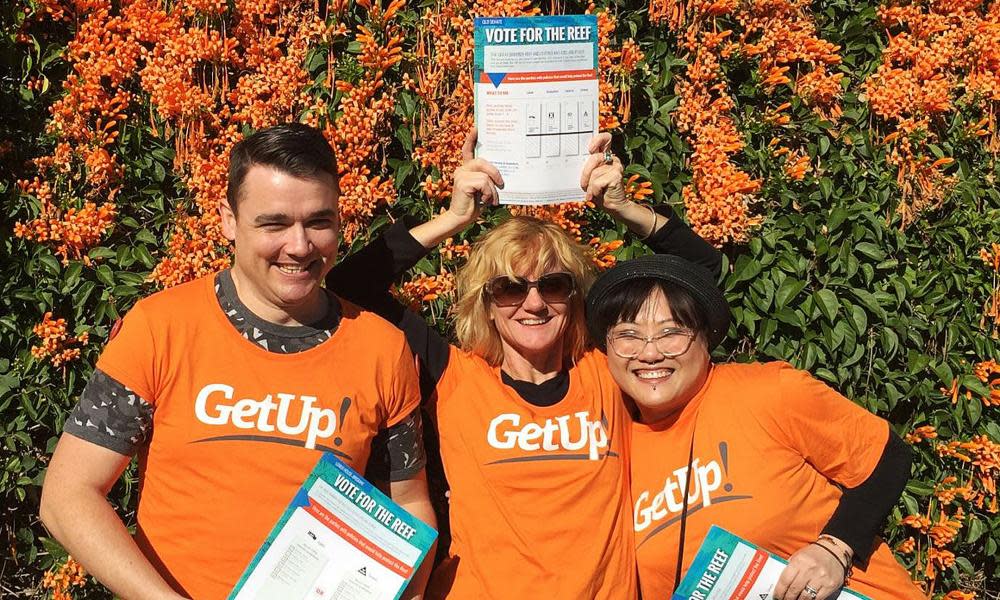Liberal MPs complain about GetUp at inquiry into 2019 election

Christian Porter has called for GetUp to be classified as a related body of Labor and blasted it for allegedly misleading voters throughout the election campaign.
The attorney general has joined Liberal MPs including Kevin Andrews in complaining about GetUp’s conduct to the parliamentary inquiry examining the 2019 election.
In two separate submissions the Liberal MP Jason Falinski has suggested Australia move to use optional preferential voting in elections and joined a unity ticket with the independent MP Zali Steggall in calling for truth in political advertising laws.
The Greens backed calls for a body other than the Australian Electoral Commission to oversee election ads, and agreed with civil society groups that want spending caps on elections.
In his submission – partially redacted by the joint standing committee on electoral matters – Porter alleged that GetUp instructed volunteers to tell voters that he had given six-figure salaries to “Liberal party colleagues and donors, including after one of them gave him a free campaign bus”.
He said the ABC article cited for the claim does not substantiate it, nor even contain any reference to the word “bus”. Porter appointed the ex-state Liberal politician Joe Francis to the Administrative Appeals Tribunal along with 13 other former Coalition MPs and staffers. But Porter said the Liberal party had agreed to purchase three campaign buses from a Western Australian company managed by Francis before the appointment was made and the buses weren’t free.
Porter also disputed GetUp’s characterisation of his position on creating a national integrity commission, but said that attempting to force retractions by GetUp was judged impractical and unaffordable during the campaign for his marginal seat of Pearce.
He called for GetUp to be classified as an associated entity of Labor – something the AEC has considered and rejected on three occasions.
Andrews submitted that he was able to force GetUp to withdraw a claim it made about him by threatening defamation proceedings, and claimed voters at polling booths felt “intimidated and harassed” by the group.
He proposed that handing out how-to-vote cards at polling places should be restricted to representatives of registered candidates.
Falinski suggested a move to optional preferential voting coupled with electronic voting, arguing it was “immoral to force a voter to vote for someone they do not wish to” and would eliminate the “stress” of voters having to decide their preferences.
In the joint submission with Steggall, the pair complained that the AEC was unable to stop misleading and deceptive conduct in elections, resulting in “insidious scare campaigns” such as Labor’s Mediscare campaign claiming the Coalition would privatise Medicare.
“At a time when the confidence of Australians in our political system is at critically low levels we must take decisive action to defend the integrity of democracy in our country and act with the moral determination and courage that the Australian people expect of us,” they said.
The Greens recommended an independent body be established to implement new truth in political advertising laws, and noted that the ACCC already had similar expertise judging misleading and deceptive claims in commercial advertising.
The Greens also called for “reasonable caps on campaign expenditure by political parties, candidates, and registered third parties”, fixed three-year terms of parliament and tighter rules around taxpayer-funded advertising in the lead-up to elections.
In other submissions Coalition MPs have called for a shorter pre-poll period and Labor has suggested the social media giants should be subjected to more scrutiny for failing to take down false material.
In its submission, the AEC defended its handling of early voting by noting that pre-poll is legislated to commence the fifth day after the declaration of nominations and pre-poll began just a day earlier in 2019 compared with the 2013 and 2016 federal elections.
The number of pre-poll votes rose from 22.7% of total votes cast in 2016 to 32.5% at the May election.
The AEC said it had increased the number of pre-poll centres from 436 in 2016 to 511 in 2019 because it wanted to achieve a “consistent service” nationwide.

 Yahoo News
Yahoo News 
